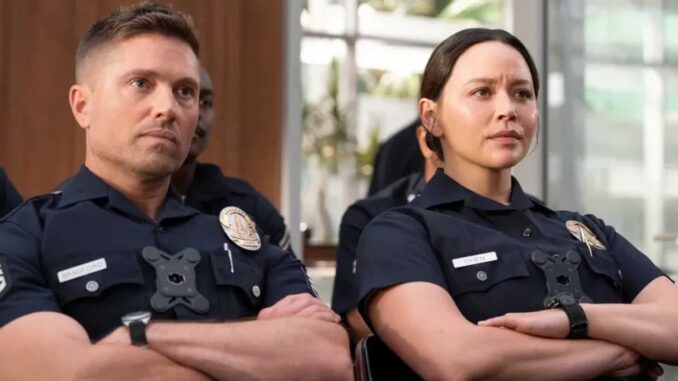
The Rookie Could Evolve Into a Long-Running TV Success
In the ever-shifting landscape of broadcast television, where shows rise and fall with the caprice of a summer breeze, the notion of a "long-running success" feels almost anachronistic. Yet, certain series possess an alchemical blend of ingredients that defy the odds, weaving themselves into the fabric of our weekly routines. "The Rookie," with its seemingly straightforward premise, exemplifies a type of show uniquely poised for this enduring evolution – a testament to the power of character-driven storytelling, an adaptable format, and an unwavering, human heart.
At its core, "The Rookie" presents an immediate, relatable hook: John Nolan, a man in his forties, walks away from a stagnant life to pursue his lifelong dream of becoming an LAPD officer. This "second chance" narrative is a wellspring of universal appeal. It speaks to the dormant desires within many of us, the longing for reinvention and the courage to chase a passion regardless of age or societal expectation. But this initial premise, while compelling, is merely the launching pad. The brilliance lies in how the show recognizes that a rookie cannot remain a rookie indefinitely. Nolan's journey from wide-eyed greenhorn to seasoned P.O., then to Field Training Officer, and eventually, a specialized officer, provides a built-in narrative arc that is both organic and essential for longevity. It allows the character, and by extension the audience, to grow, to face new challenges, and to understand the evolving intricacies of law enforcement from multiple perspectives. This isn't a static character study; it's a dynamic career trajectory unfolding in real-time, preventing the central premise from growing stale.
Beyond its compelling lead, "The Rookie" understands the crucial role of a robust ensemble. A single star, no matter how bright, can only carry a show so far. It is the constellation of supporting characters, each with their own distinct voice, struggles, and aspirations, that forms the rich tapestry of a long-running success. We see this in the meticulously crafted arcs of Lucy Chen, evolving from an eager but naive rookie to a sharp, confident officer navigating the complexities of undercover work and personal relationships. Her slow-burn romance with the gruff yet principled Tim Bradford – a fan-favorite "Chenford" dynamic – offers a masterclass in character development, showcasing how evolving partnerships can add layers of emotional depth and continuous intrigue. Likewise, Angela Lopez's journey through motherhood, career ambition, and personal danger, and Nyla Harper's complex return to uniform policing after years of undercover work, ground the show in diverse experiences, ensuring that the narrative well never runs dry. These characters aren't just satellites orbiting Nolan; they are stars in their own right, each capable of anchoring an episode or an entire storyline, thereby distributing the narrative weight and safeguarding against a potential dip in interest should the lead's arc momentarily plateau.
Furthermore, the show’s structural flexibility is a hallmark of its potential for enduring success. "The Rookie" masterfully balances the procedural "case-of-the-week" format with overarching serialized storylines. Each episode delivers the satisfaction of a self-contained crisis, a crime solved, or a community served – providing a reliable comfort for viewers. Yet, woven into this framework are threads of continuing drama: a lingering criminal threat, a character's personal crisis, or the slow, tender growth of a relationship. This duality ensures that casual viewers can tune in without feeling lost, while dedicated fans are rewarded with a continuous, evolving narrative. The LAPD setting itself offers an inexhaustible supply of scenarios, from high-stakes bank robberies to the quiet, poignant moments of community policing, allowing the show to remain fresh by constantly exploring new facets of its world. It's a narrative scaffold that supports endless permutations of human drama, action, and social commentary.
Finally, "The Rookie" possesses a crucial, often underestimated quality for long-term appeal: tonal dexterity. It fearlessly pivots between gripping, often violent, dramatic sequences and moments of genuine humor and heartfelt camaraderie. One moment, we're holding our breath as a bomb ticks down or a serial killer stalks his prey; the next, we're chuckling at Tim Bradford's gruff, almost paternal, advice to Lucy Chen, or the awkward but endearing banter between Nolan and his colleagues. This ability to navigate the full spectrum of human emotion, to find laughter amidst the danger and hope within the despair, prevents the show from becoming monochromatic or emotionally exhausting. It also subtly tackles contemporary social issues surrounding policing – accountability, systemic bias, community trust – without becoming preachy, instead framing these discussions through the lived experiences and ethical dilemmas of its characters. This reflective capacity keeps the show relevant, ensuring it resonates with an audience grappling with similar questions in the real world.
In conclusion, "The Rookie" is not just a show about a man finding his calling; it is a masterclass in the architecture of television longevity. By building upon a relatable foundational premise, nurturing a vibrant and evolving ensemble cast, embracing a flexible narrative structure, and demonstrating a nuanced tonal range, it has cultivated a rich, dynamic world. These elements coalesce to create a viewing experience that is both comforting and challenging, predictable yet surprising. It is this evolving synthesis of character, plot, and heart that allows "The Rookie," and shows like it, to transcend fleeting trends and truly evolve into a long-running, cherished success, etching its stories into the collective memory of its audience, one patrol shift at a time.